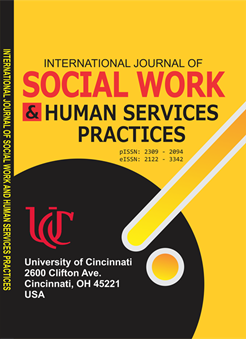INTERNATIONAL JOURNAL OF SOCIAL WORK AND HUMAN SERVICES PRACTICES (IJSWHSP)
THE ROLE OF HR PRACTICES, BIG DATA ANALYTICS AND INNOVATION IN FOSTERING SUPPLY CHAIN RISK RESILIENCE AND ORGANIZATIONAL SUSTAINABILITY
E-ISSN: 2122-3342
P-ISSN: 2309-2094
DOI: https://iigdpublishers.com/article/861
This study explores the factors influencing logistics firms' risk resilience during crisis periods, with a focus on HR practices, big data analytics capabilities, and innovation. The research further examines the moderating role of disruptive events in the relationship between risk resilience and organizational sustainability. A quantitative research design was employed, utilizing data collected from 156 employees through a structured questionnaire. The findings demonstrate that the proposed framework has significant predictive capability, with Q² values of 36.6% for risk resilience and 41% for organizational sustainability. The analysis highlights that HR practices, employee development, big data analytics talent and management capabilities, and innovation collectively explain 52.3% of the variance in supply chain risk resilience. Moreover, the combined effect of risk resilience and responses to disruptive events accounts for 55% of the variance in organizational sustainability. These findings emphasize the importance of prioritizing data analytics talent development, effective HR practices, and proactive response strategies to enhance the risk resilience and sustainability of logistics firms. Practical implications suggest that policymakers and industry leaders should focus on improving these critical factors to better navigate challenges posed by crises and disruptive events. This research contributes novel insights into the determinants of supply chain risk resilience and organizational sustainability, offering a valuable framework for strengthening the logistics sector's adaptability and long-term viability in a dynamic and uncertain business environment.
Abdulrahman Awadh Aljuaid, Faisal Saad Alqahtani, Sultan Ahmed Mohammed Albarakati & Yazeed Abdullah Alomari
Akgün, A. E., Ince, H., Imamoglu, S. Z., Keskin, H., & Kocoglu, İ. (2014). The mediator role of learning capability and business innovativeness between total quality management and financial performance. International Journal of Production Research, 52(3), 888- 901. https://doi.org/10.1080/00207543.2013.843796
Akter, S., Wamba, S. F., Gunasekaran, A., Dubey, R., & Childe, S. J. (2016). How to improve firm performance using big data analytics capability and business strategy alignment? International Journal of Production Economics, 182, 113-131. https://doi.org/10.1016/j.ijpe.2016.08.018
Altay, N., Gunasekaran, A., Dubey, R., & Childe, S. J. (2018). Agility and resilience as antecedents of supply chain performance under moderating effects of organizational culture within the humanitarian setting: a dynamic capability view. Production planning & control, 29(14), 1158-1174.
Bag, S., Wood, L. C., Xu, L., Dhamija, P., & Kayikci, Y. (2020). Big data analytics as an operational excellence approach to enhance sustainable supply chain performance. Resources, Conservation and Recycling, 153, 104559. https://doi.org/10.1016/j.resconrec.2019.104559
Barney, J. (1991). Firm resources and sustained competitive advantage. Journal of Management, 17(1), 99-120. https://doi.org/10.1177/014920639101700108
